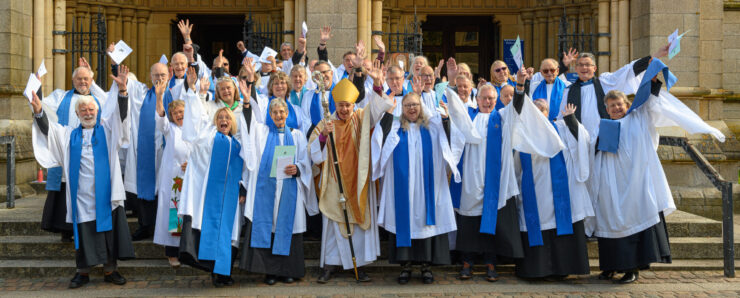
Are Readers a Dying Breed? Some thoughts to get you thinking and discussing! Do let me know what YOU think and I will post the responses.
At the annual Reader service, now renamed ‘A celebration of Licensed Lay Ministries’ so that it reflects the inclusion of pioneers, I had several conversations with Readers reflecting on the number present and the demographic. One was surprised when I told him that there were only just over a hundred readers in the diocese if we included those in training.
((Link to the Diocesan Website report and pictures of the Annual service 2024
Recognition for Licensed Lay Ministers – Truro Diocese : Truro Diocese )) https://trurodiocese.org.uk/2024/10/recognition-for-licensed-lay-ministers/
So what is the future for readers or licenced lay ministers are we a dying breed?
Are we the dinosaurs of the church?
With ageing congregations there are fewer folk to train of any age let alone those in the first half of life. Worship leader courses enable people to take services and give talks. (The latter often being very close to a sermon!) The training model, in order to comply with C of E church assessors must beat the criteria of a common awards which is why it formed an alliance with the SWMTC. The knock-on has been an Exeter-centric approach and a very long heavy training burden which, have seen a not-insignificant dropout rate.
I was 36 when I began training as a reader; I was a deputy head teacher and father of two young children. There was no way on earth I could have trained on the current course given that burden, so I do wonder whether current training is fit for purpose. If we are to call ourselves readers and licenced lay ministers, those who teach, preach and encourage everyday faith do we really need a common award certificate or would a slimmer local course with a Bishop’s certificate of some sort suffice?
When I first got involved in reader training as chaplain to readers and part of the discernment team, the course was with Saint Johns. It was held locally, staffed by excellent teachers from around the diocese, was collegiate and built up a very special team of people. Interspersed with the teaching were Saturdays of practical work which seemed to make sense of all the theology that they learned along the way.
Following inspection by the national Ministry however the Saint Johns course materials were thought of as being not strong enough and so things had to change even though the assessors agreed that the local teaching was of a very high standard.
The current course involves seven weekends in Plymouth, reflective practice groups online or in person in Truro and also requires a huge commitment to placement. For anybody working over the young family this burden goes beyond sacrifice and put such stress on people that I do wonder its efficacy. My father once gave me a quotation which he attributed to Walter Lipmann but I can’t find anywhere but I still like it,
“if in the pursuit of the perfect, we wreck the best that is possible, then the longing for the absolute is akin to madness!”
Lay ministries across the Church of England are blossoming in all sorts of ways. In this diocese we have Readers, Local Lay Ministers who have been through the excellent Sens Kernewek course, worship leaders, pioneer ministers of all sorts, pastoral ministers and lay workers with courses ranging from a dozen hours of training to several years. It is no wonder that Reader numbers are dropping.
This year it has been interesting to see so many Readers who are now taking the pathway to ordination. Some of those trained locally but most went through the Course at SWMTC and so know what to expect. I am sure some will have ben given a pass for some aspects they would otherwise have repeated but there are still some aspects that they will do again.
I wonder how much credit is given for the course they have already done, for the most part with the ordinands, and whether there is much advantage to having a common award accreditation before starting.
So tell me what you think!
- What did you think of your own training?
- What do you think is the future of Reader Ministry?
- If you were doing a course now, what kind of commitment would you expect?
- What is more useful,
- On the job training with local tutors
- An accredited academic course with bolt-on practical work.
- A flexible course where individuals could map out their own path and take the time they need rather than having too many deadlines.
- Something else……